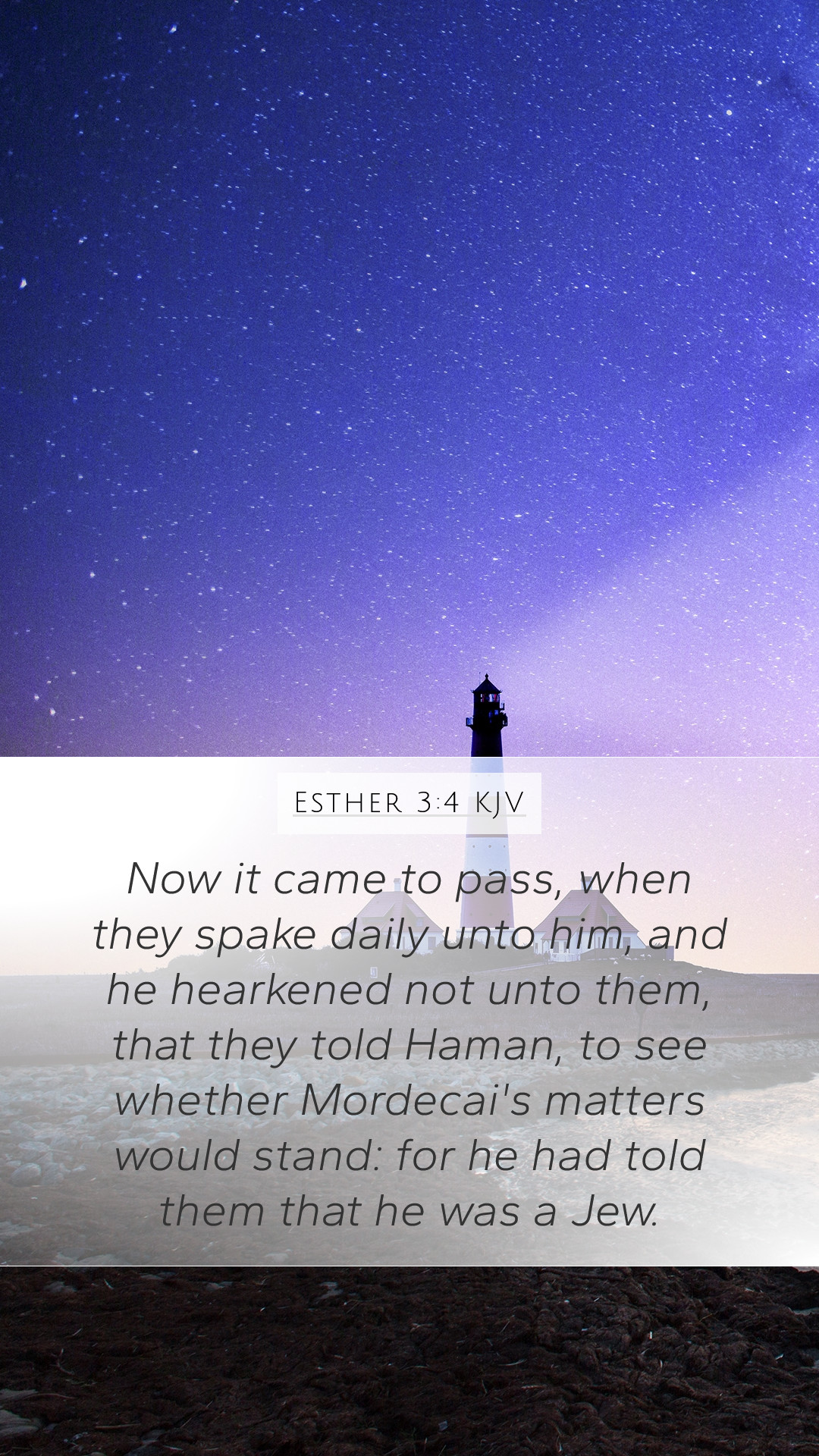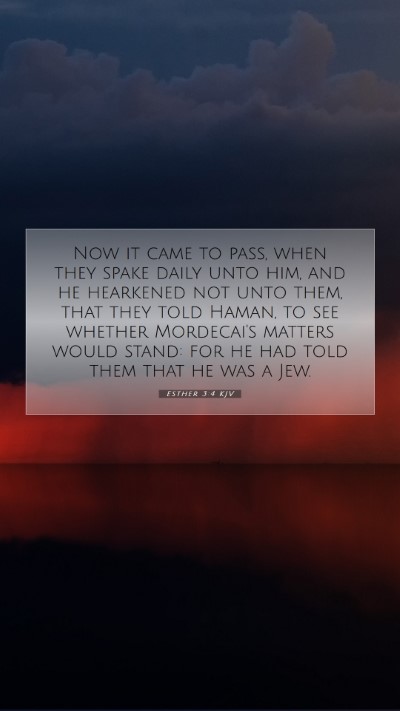Old Testament
Genesis Exodus Leviticus Numbers Deuteronomy Joshua Judges Ruth 1 Samuel 2 Samuel 1 Kings 2 Kings 1 Chronicles 2 Chronicles Ezra Nehemiah Esther Job Psalms Proverbs Ecclesiastes Song of Solomon Isaiah Jeremiah Lamentations Ezekiel Daniel Hosea Joel Amos Obadiah Jonah Micah Nahum Habakkuk Zephaniah Haggai Zechariah MalachiEsther 3:4 Meaning
What is the meaning of Esther 3:4?
Now it came to pass, when they spake daily unto him, and he hearkened not unto them, that they told Haman, to see whether Mordecai's matters would stand: for he had told them that he was a Jew.
Esther 3:4 Bible Verse Meaning
Understanding Esther 3:4
Esther 3:4 presents a situation where the royal decree of Haman brings forth a significant conflict in the Jewish community. This passage encourages us to explore deeper Bible verse meanings, interpretations, and commentaries to uncover its implications.
Verse in Context
The context of Esther 3:4 reveals a pivotal moment during the reign of King Ahasuerus. Haman, a high-ranking official, seeks to eradicate the Jewish people, and when he faces resistance from Mordecai, a Jewish man who refuses to bow to him, he devises a plan that affects an entire nation. The significance of this verse stretches beyond its historical setting into profound themes of oppression, faith, and divine providence.
Commentary Insights
- Matthew Henry: Henry interprets this verse to show the malice of Haman and the dangers that arise from pride and high ambition. He emphasizes how this event sets the stage for God's deliverance of His people.
- Albert Barnes: Barnes provides an analysis of how the actions of Haman reflect both personal vengeance against Mordecai and a broader enmity towards the Jewish people. He underscores the importance of understanding this conflict in the light of God's plans for the Jewish nation.
- Adam Clarke: Clarke focuses on the social and religious implications of Haman's decree. He notes that the refusal to bow was not just a personal affront but an act of faith. Clarke points out how the Jewish response becomes vital in understanding this conflict.
Key Themes
- The Danger of Pride: Haman’s unchecked ambition serves as a warning against prideful behavior and its consequences. It emphasizes the moral lessons reflected in various Bible verse analyses.
- The Power of Faith: Mordecai’s refusal to bow highlights the importance of standing firm in faith, a theme prevalent throughout scripture, leading to questions like "How to interpret Bible verses related to faith."
- Divine Providence: The unfolding events suggest that what appears to be a dire situation for the Jews can be a setup for divine intervention, aligning with themes found in the larger narrative of the Bible.
Application of the Passage
Understanding Esther 3:4 allows us to reflect on how we respond to oppression and challenges in our own lives. The principle of standing for one's faith is applicable in contemporary situations where moral dilemmas demand courage and integrity.
Related Scriptures
- Esther 2:5-7 – Provides background on Mordecai and Esther, setting the stage for the conflict.
- Esther 4:1-3 – Reveals the Jewish people's reaction to Haman's decree.
- Romans 12:19 – Addresses vengeance and the reminder of God's ultimate control over justice.
- Psalms 34:17-19 – Affirms that God hears the cries of the righteous and delivers them from troubles.
Conclusion
Esther 3:4 is a verse that encapsulates a battle not only of cultures and peoples but of faith versus tyranny. Through examining this verse in the context of biblical narrative, we gain rich insights into the meaning of Bible verses, the importance of understanding scripture, and how historical context can enhance our interpretation.
Further Study
For those engaging in Bible study groups, this verse presents numerous topics for discussion, exploration, and application in today's context. Utilize Bible study tools and resources to delve deeper into the exegesis of not just this passage but the overarching themes of the Book of Esther.
SEO Considerations
The insights provided here aim to assist readers searching for Bible verse meanings, Bible verse commentary, and understanding Scripture. By exploring Esther 3:4, we encourage a deeper engagement with the text, prompting further inquiry into related scripture and the historical context of biblical passages.


